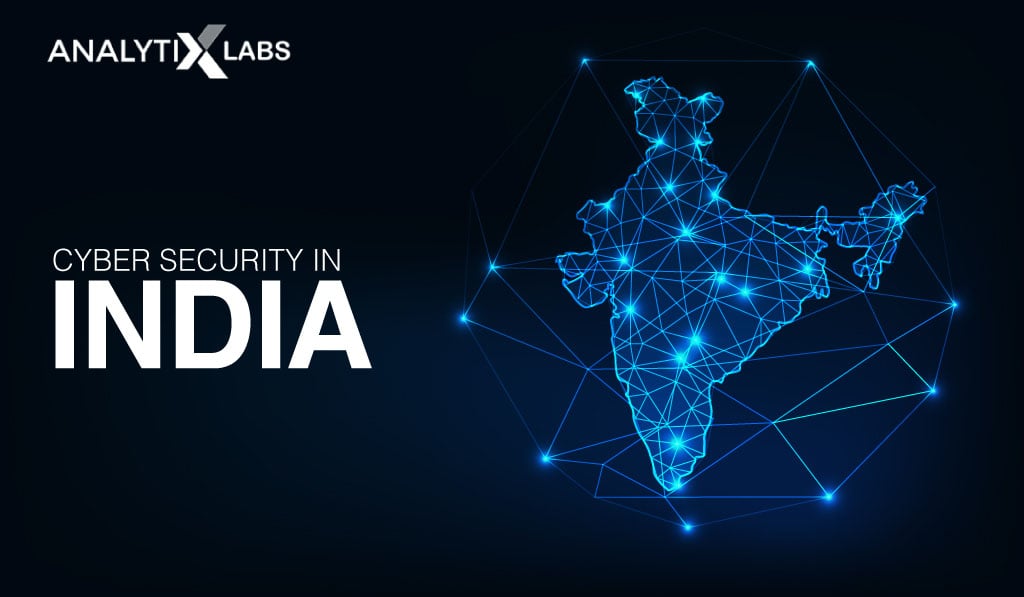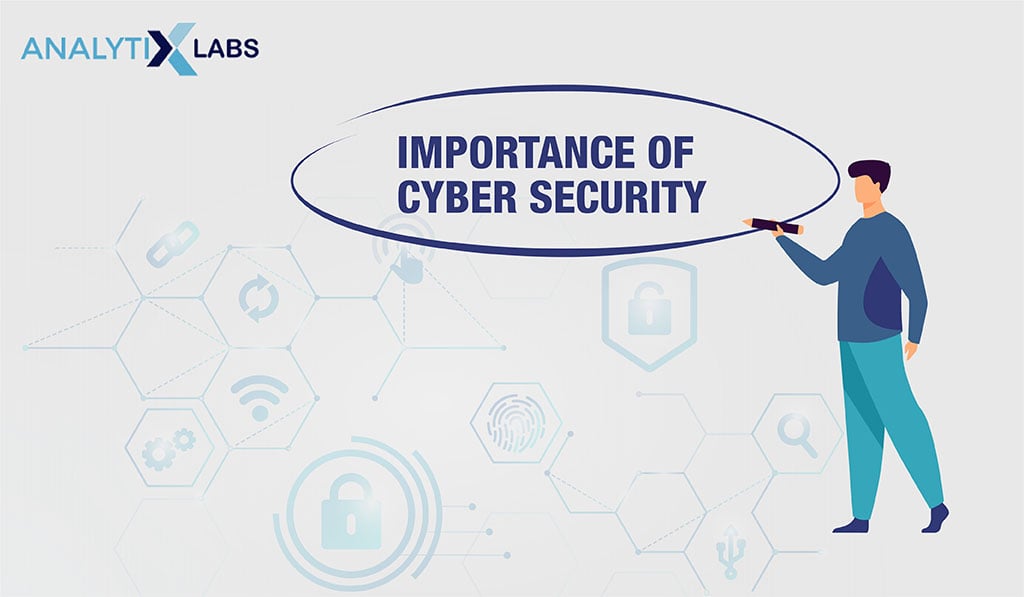Artificial intelligence is steadily progressing towards taking over the world we live in. While this has some time, Global AI Adoption Index suggests that 32% of IT companies have already deployed AI while 42% are exploring it. The direct consequence of this steady adoption is that a huge number of cyber security job positions have opened up. The global heat map shows almost 6,00,000 cyber security jobs open, all thanks to AI. What does this mean? The competition for cyber security roles is getting intense, making way for a lucrative cyber security salary range. Want to know the cyber security salary in India specific? Read on.
Cyber Security in India
Cyber security is one of the most desirable fields for freshers and experienced IT professionals alike. This is because companies need Skilled cyber security analysts, engineers, architects, testers, and managers to protect digital assets, programs, sensitive information, and data in general, from hackers and cyber-attacks. While cyber security architect job role ranks among the top 14 most sought-after jobs, United Nations ITU Global Cybersecurity Agenda has placed India in the 10th position globally.
The covid-19 pandemic has pushed the world into digital payment, and now we are heavily dependent on it. A majority number of brands have closed down their brick-and-motor stores and shifted to online businesses. This resulted in more online services, purchases, and transactions. What followed suit is hacking and breaching of sensitive data.
Not just eCommerce, but schools, offices, and businesses across other sectors have moved online. There are endless avenues for hackers to tap into, and they are doing so with full force. Hacking online classes to show adulterated videos or creeping into central systems to shut down schools or finding a way into smartphones to access financial details – there’s so much at stake already.
What is India doing to handle cyber security?
India, as a country, has already put its best foot forward to handle the increasing risks that digitalization has brought. For instance, the Indian Government repeatedly sends out notifications and reminders for everyone to never share OTPs with strangers or over a call.
India’s cyberspace is connected to the internet due to which multiple critical infrastructures are always at risk. This is primarily because data are interconnected with each other. A single user’s information is tied up together to form unique 360-degree profiling, which is good for business but even better for a hacker – one tap, and all information gets breached.
India has designated funding of INR 170 crore to support cyber security projects in 2021. This is a huge leap from the previous budget of INR 102 crore. Simultaneously, India is doing everything in its power to educate its citizens about the risks and also the steps required to stay safe.
In this article, we will explore the types of cyber security, the average cyber security salary in India, skills required, and how/where to get started.
Cyber Security: Categories
There is no denying that cyber security is extremely important in the digital age that we are living in. We save almost everything on the cloud and access the most sensitive information across multiple devices – like banking, finances, investments, stocks, personal details, images, videos, and more. As a result, breaches happen more often than we want them to. For instance, the recent breach on Crypto.com where 483 users’ wallets were compromised amounting to 30 million USD at stake. Hence, we cannot even begin to gauge how crucial cyber security is, and even more the professionals responsible for keeping it all together. Cyber security is classified into 8 types, as follows:
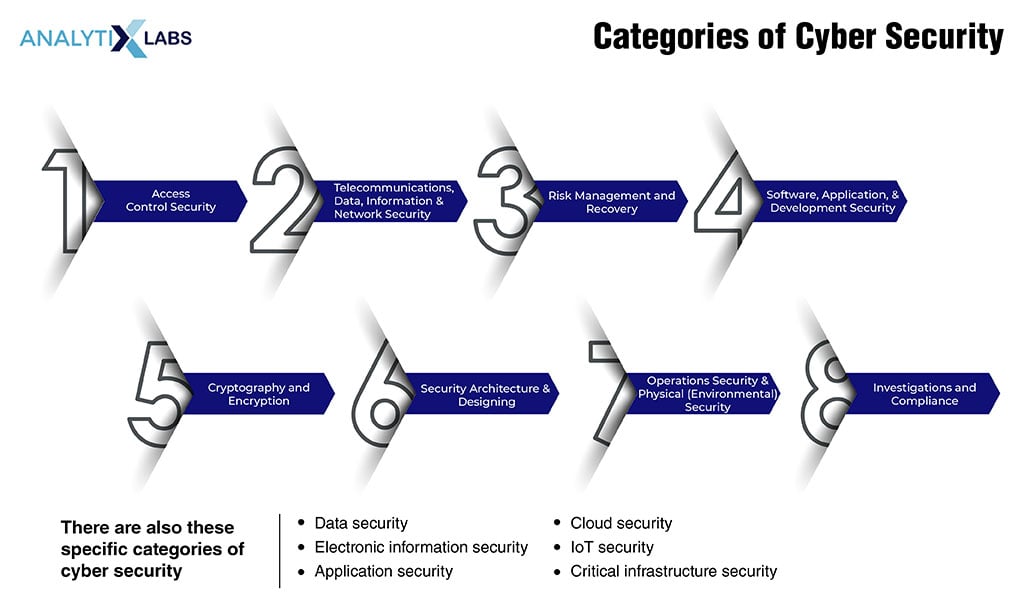
Access Control Security
This category of cyber security ensures that authentication processes are secured and used in accordance with authorization. The professionals working in this kind of cyber security also track and monitor access events or suspicious activities.
Telecommunications, Data, Information, and Network Security
This cyber security domain deals with securing information and maintaining the confidentiality of communication. It protects both data and live communication. Professionals in this field ensure that data is always available and its integrity is maintained.
Risk Management and Recovery
This type of cyber security deals more with the after-effects of a breach and helps in restoring regular operations. The department is also responsible for data retrieval. Professionals are in charge of ensuring that proper recovery methods are set in place. To manage risks, tools are installed to contain the outcome of breaches or frequently back up data.
Software, Application, and Development Security
This category of cyber security deals with scanning software and programs in order to identify defects and vulnerabilities that can compromise data or users of the software. This domain is also heavily involved during development processes to ensure that guidelines and regulations are met. It also frequently tests applications and makes sure that internal policies are all catered to.
Cryptography and Encryption
As the name suggests, this category handles encrypting and decrypting of sensitive information that can compromise the business operations of a company. This field ensures that certain data can only be accessed by members for whom the data is meant.
Security Architecture and Designing
This category designs the security architecture and puts the security frameworks in place. It also ensures that only authorized protocols and services are incorporated, after which security experts patch any vulnerability in the design of the secure cyberspace. These professionals also handle firmware and software upgrades to reinforce the security of IT infrastructure.
Operations Security and Physical (Environmental) Security
This category is extensively involved in dealing with physical instruction prevention and detection. Running background checks on employees, maintaining systems, and installing physical locks on hardware such as password or authentication systems are also responsibilities of this domain.
Investigations and Compliance
This domain deals with investigating suspicious activities and predicting future attacks. It is also associated with ensuring that regulatory compliance is maintained. Furthermore, the analysts in this domain enforce legal action upon violation of these guidelines.
There are also a few categories that are otherwise incorporated in the types mentioned above. These are:
- Data security
- Electronic information security
- Application security
- Cloud security
- IoT security
- Critical infrastructure security
Now that you know how professionals handle security under each category, let’s take a look at the skills required to become a cyber security professional.
Mandatory skills of a Cyber Security professional
Cyber security experts must have a variety of skills in order to identify and fix security defects. Apart from having the ability to analyze potential risks and how to bump up cyber defenses, cyber security professionals also must know how to use antivirus tools and firewalls to handle worms, viruses, and botnets. Security specialists operating in cyberspace must be able to deal with malicious code, advanced Trojans, phishing activities, cyber espionage, and hacking efforts.
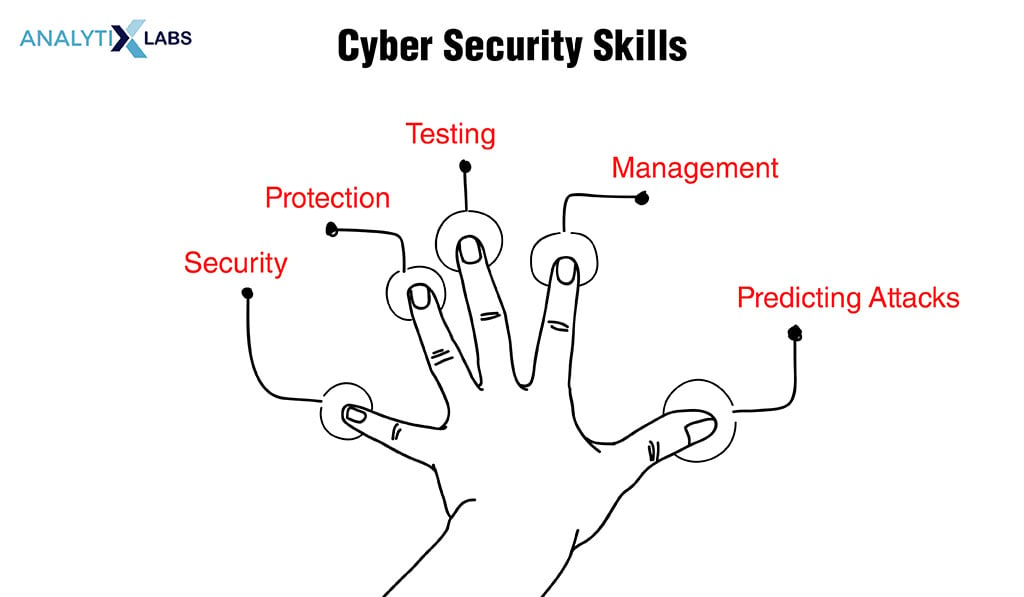
Some of the key skills include:
- Network security skills
- Malware protection skills
- Monitoring abilities and a knack for identifying risks
- Analyzing and predicting attacks
- Application security testing
- Integration testing
- Security architecture designing
- Penetration testing
- Black-box testing
- Incident management
- Providing support during live attacks
- Reinforcing systems
- Security frameworks and tools
- Incident management
- Cryptography
- Data governance
- Cyber threat management
- Reinforcing hardware and mobile devices
- User access and user privilege management
- Information risk management
- White-hat hacking
Along with these key skills, here are some traits that a cyber security professional must have:
- Technical aptitude
- Problem-solving skills
- Business communications
- Security knowledge of various platforms and systems
- Attention to detail and forensic skills
- Hacking concepts
Now, let’s address the elephant in the room: How much is the cyber security salary in India per month or annually?
Cyber security salary in India – 2024 Edition
Note: Salary figures change every month/year. The below numbers are as visible in May 2024. We will continue updating the numbers frequently.
According to Glassdoor, the annual average base payout is between ₹5L – ₹21L/yr. For specific roles in cyber security, salaries are as follows:
- Cyber security analyst: INR ₹4L – ₹8L/yr
- Information security analyst: INR ₹4L – ₹9L/yr
- Senior information security analyst: INR 12,00,000/yr
- Cyber security consultant: INR ₹5L – ₹13L/yr
- Network security engineer: INR ₹5L – ₹10L/yr
- Information security manager: INR ₹7L – ₹16L/yr
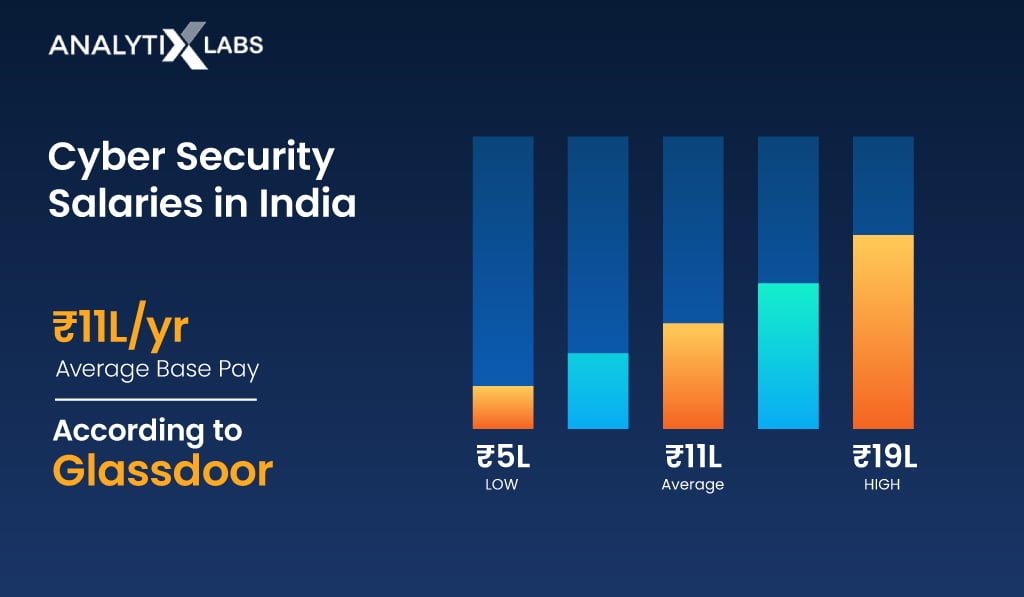
Let’s check the average base salaries offered to cyber security analysts by top Indian corporations and foreign MNCs in this highly IT-centric nation.
- Tata Consultancy Services: INR 4,81,696/yr with an additional pay average of INR 24,648
- HCL Technologies: INR 5,06,892/yr with an additional pay average of INR 73,563
- Google: INR 6,42,262/yr with no additional pay reported on Glassdoor
- Amazon: INR 8,16,339/yr with an additional pay average of INR 19,968
- Deloitte: INR 6,70,000/ yr with an additional pay average of INR 56,038
- IBM: INR 5,30,000/yr with an additional pay average of INR 21,231
- Accenture: INR 5,90,000 with an additional pay average of INR 5837
- Cognizant Technology Solutions: INR 7,32,798/yr with an additional pay average of INR 49,979
Factors affecting the average payouts in India
The cyber security salary in India is dependent on several factors as below:
1. Location
One of the prime causes of salary difference is location. In India alone, you will find the salary varying according to location. For instance, a cyber security analyst in Bangalore can earn around INR 5,44,411/yr with additional pay of INR 71,629. For the same role, the salary in Pune is INR ₹4L – ₹8L/yr with additional pay of INR 58,000, and in Delhi, it’s INR ₹4L – ₹10L/yr with additional pay of INR 51,251. The difference may not be huge figuratively but it’s there. This disparity in salary numbers depends on the demand-supply ratio in each city. Also, if in a location, a majority of candidates refuse to relocate, there the salary can be higher as compared to other cities in order to lure talents.
NB: All the salary figures mentioned above are average numbers for freshers to mid-senior levels.
2. Experience
Job experience plays a pivotal role in the salary slab that you are entitled to. A highly experienced professional will have more skills and will mostly be an all-rounder who can handle multiple facets of cyber security. Add to this, experience teaches you a practical approach to a problem, making it easier for the professional to handle difficult security issues. On average, while the cyber security salary in India for freshers is between INR 3L-5L/year, a highly experienced professional gets INR 7L-10.5L/year.
3. Certifications
A certified cyber security professional will always earn more salary than a non-certified professional. Accredited courses are also a great way of increasing your chances of bagging desirable salary packages. Another factor that plays a major role is the institute. If a professional hails from a highly reputed institute and has a good grade, he/she will earn more than the average payout. Even if the grades are average but from a very reputed tier 1 institute, the pay will be comparatively good. So, when you enroll in a cyber security course, opt for a certified and reputed institute.
Few other factors that impact the salary
- Projects – Engaging in projects with various tools or having done internships is a great way to get a handsome salary in the company you apply to
- Security tools suite and the skills you have mastered
- Security frameworks you are comfortable with and your domain specialization. For example, information security management pays extremely well as compared to other departments
- And finally, how well did you perform in your interview, and how much knowledge you have gained about the field of cyber security
This brings us to the end of understanding cyber security salary in India. While the demand for cyber security professionals is on a rise, you may still have some impending questions to clarify. Below are a few commonly asked questions that our students ask.
Cyber security salary in India 2024 – FAQs
1. How much do cyber security experts earn in India?
Cyber security experts such as Senior Information Security analysts earn an average of INR 10,00,000 per annum in India. Security consultants also earn very desirable salaries of INR 9,00,000 on average annually. Meanwhile, Information Security managers earn a massive salary of INR 1,593,609 per annum on average. Cyber security salary in India 2024 is one of the best out of all the industries here.
2. Is cyber security a good career in India?
Yes, cyber security is a highly respected and desirable career in India. It is also one of the most upcoming career options in this country. India relies heavily on its IT infrastructure and cyberspace, thus making cyber security professionals an absolute necessity in this country.
3. Does cyber security pay well?
Yes, the average cyber security salary in India for freshers is one of the best in the Information and Telecommunications industries. Cyber security salary in India for freshers, annually, is anywhere between INR 5,00,000 and INR 6,00,000 on average.
If you have more queries, write to us or drop a comment on this blog to catch our eyes.
P.S. AnalytixLabs runs several courses on cyber security. We are touted as one of the best institutes in India, especially in Delhi and Bangalore region. Our teaching faculty hail from top IIT and IIM institutes with in-depth practical and industry knowledge. We train our students to be professionally adept with current tools and business problems. From one-on-one FAQ sessions to self-paced learning as well as classroom sessions – our learning is designed keeping your best interest in mind. Explore courses on AnalytixLabs now.

